Volkswagen Case Study: Ethical Leadership and Practices
VerifiedAdded on 2020/12/10
|12
|3999
|487
Case Study
AI Summary
This case study analyzes the Volkswagen emissions scandal, examining the unethical practices employed by the company, specifically the use of "defeat devices" in its vehicles. The report identifies key stakeholders affected by the scandal, including employees, customers, shareholders, and the environment. It applies ethical theories such as utilitarianism and Kantianism to evaluate the company's actions and their consequences. The analysis explores the qualities of ethical leadership and the importance of creating an ethical organizational culture. The study recommends restructuring the corporate culture to ensure adherence to ethical and legal procedures, hiring ethically conscious employees, and providing adequate training to the workforce. The case highlights the detrimental impact of unethical decisions on corporate reputation and the importance of prioritizing ethical conduct for long-term sustainability.
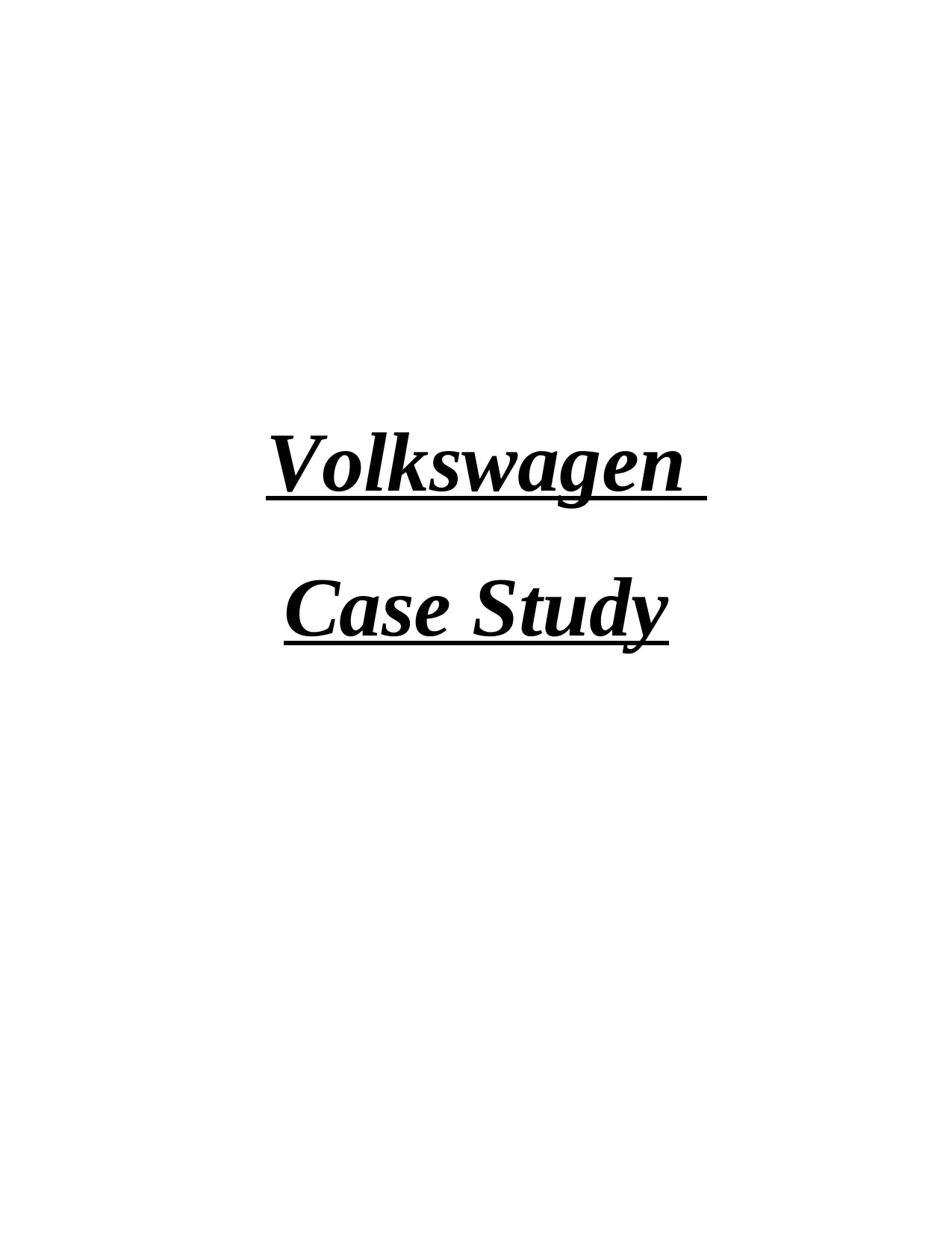
Volkswagen
Case Study
Case Study
Paraphrase This Document
Need a fresh take? Get an instant paraphrase of this document with our AI Paraphraser
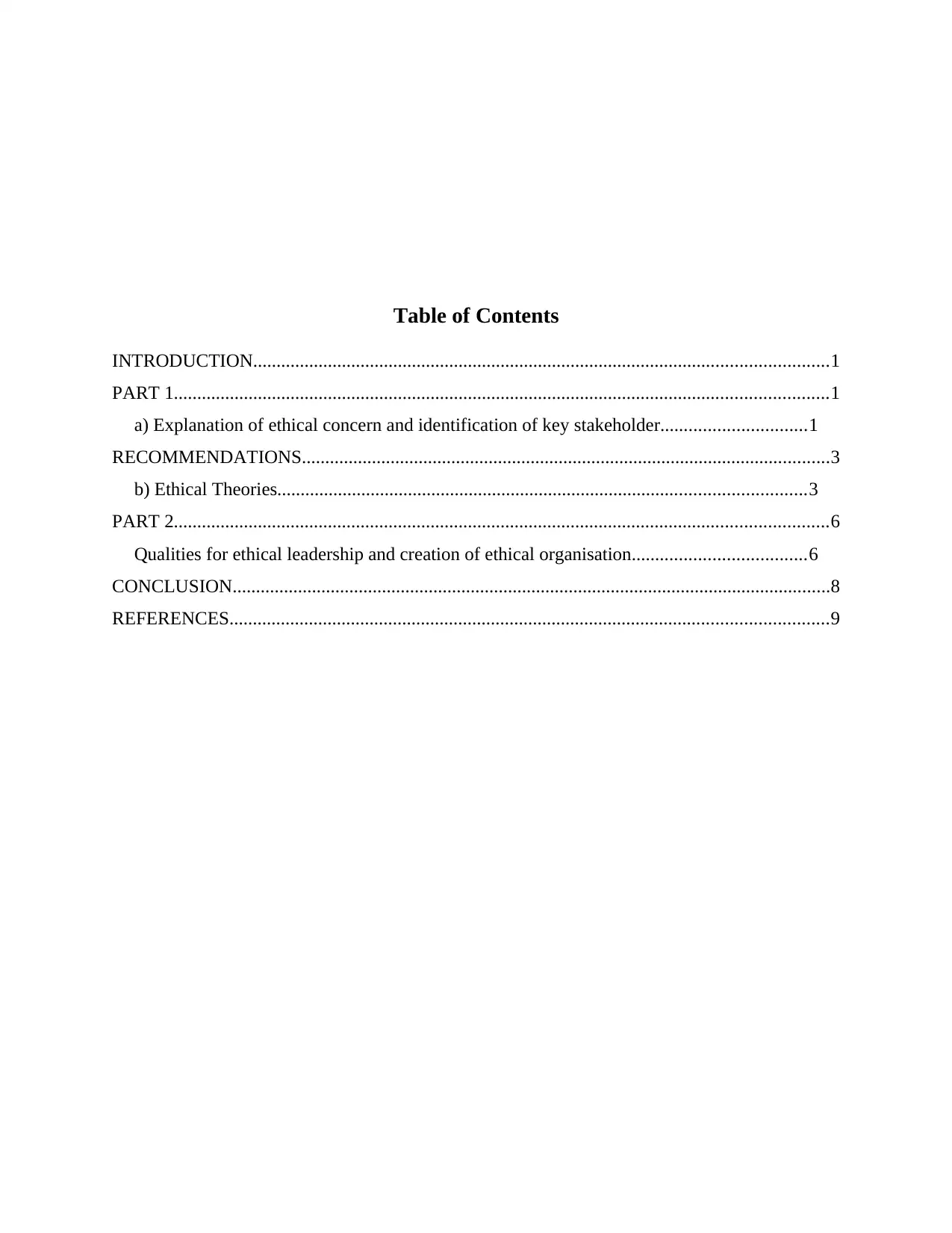
Table of Contents
INTRODUCTION...........................................................................................................................1
PART 1............................................................................................................................................1
a) Explanation of ethical concern and identification of key stakeholder...............................1
RECOMMENDATIONS.................................................................................................................3
b) Ethical Theories.................................................................................................................3
PART 2............................................................................................................................................6
Qualities for ethical leadership and creation of ethical organisation.....................................6
CONCLUSION................................................................................................................................8
REFERENCES................................................................................................................................9
INTRODUCTION...........................................................................................................................1
PART 1............................................................................................................................................1
a) Explanation of ethical concern and identification of key stakeholder...............................1
RECOMMENDATIONS.................................................................................................................3
b) Ethical Theories.................................................................................................................3
PART 2............................................................................................................................................6
Qualities for ethical leadership and creation of ethical organisation.....................................6
CONCLUSION................................................................................................................................8
REFERENCES................................................................................................................................9

⊘ This is a preview!⊘
Do you want full access?
Subscribe today to unlock all pages.

Trusted by 1+ million students worldwide
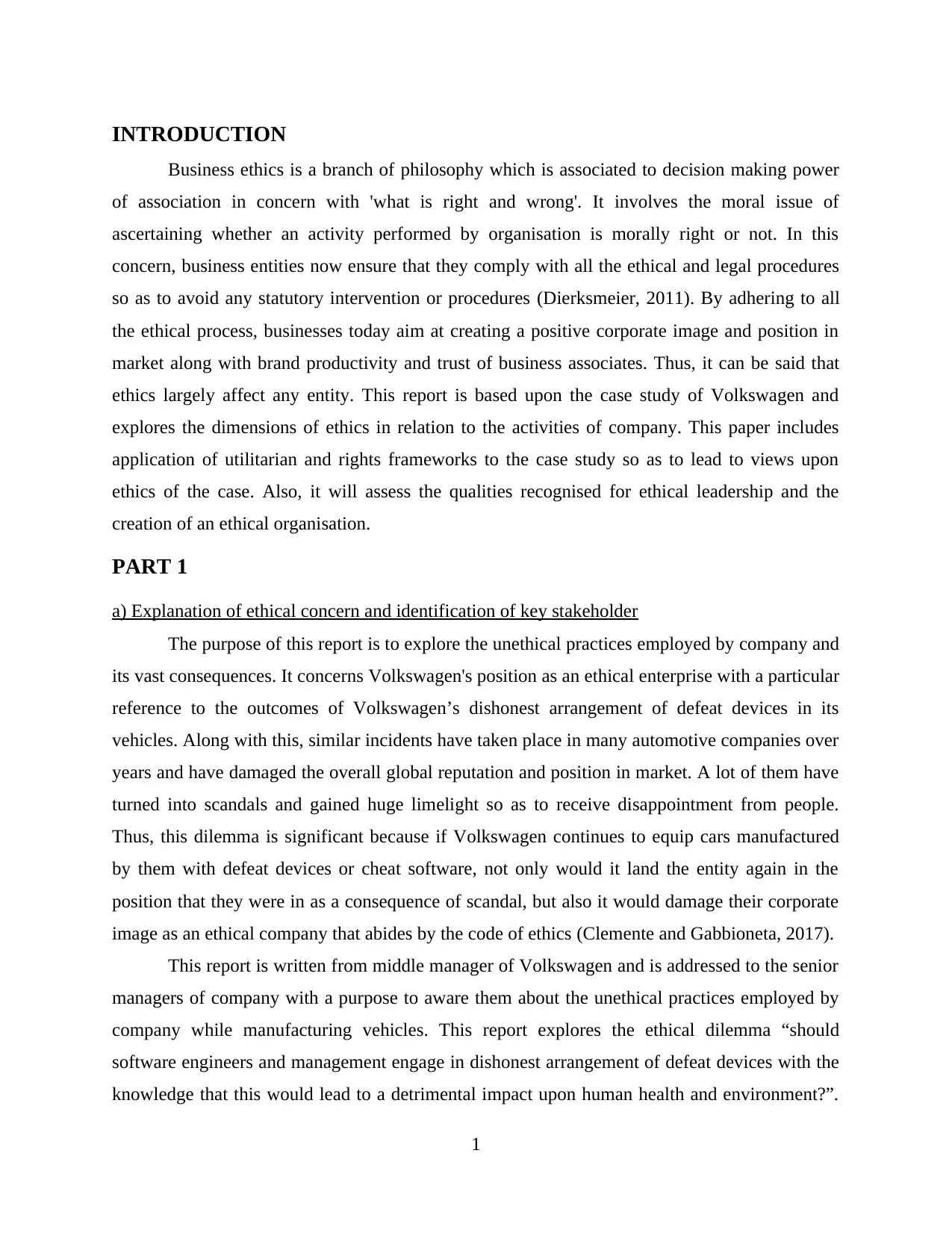
INTRODUCTION
Business ethics is a branch of philosophy which is associated to decision making power
of association in concern with 'what is right and wrong'. It involves the moral issue of
ascertaining whether an activity performed by organisation is morally right or not. In this
concern, business entities now ensure that they comply with all the ethical and legal procedures
so as to avoid any statutory intervention or procedures (Dierksmeier, 2011). By adhering to all
the ethical process, businesses today aim at creating a positive corporate image and position in
market along with brand productivity and trust of business associates. Thus, it can be said that
ethics largely affect any entity. This report is based upon the case study of Volkswagen and
explores the dimensions of ethics in relation to the activities of company. This paper includes
application of utilitarian and rights frameworks to the case study so as to lead to views upon
ethics of the case. Also, it will assess the qualities recognised for ethical leadership and the
creation of an ethical organisation.
PART 1
a) Explanation of ethical concern and identification of key stakeholder
The purpose of this report is to explore the unethical practices employed by company and
its vast consequences. It concerns Volkswagen's position as an ethical enterprise with a particular
reference to the outcomes of Volkswagen’s dishonest arrangement of defeat devices in its
vehicles. Along with this, similar incidents have taken place in many automotive companies over
years and have damaged the overall global reputation and position in market. A lot of them have
turned into scandals and gained huge limelight so as to receive disappointment from people.
Thus, this dilemma is significant because if Volkswagen continues to equip cars manufactured
by them with defeat devices or cheat software, not only would it land the entity again in the
position that they were in as a consequence of scandal, but also it would damage their corporate
image as an ethical company that abides by the code of ethics (Clemente and Gabbioneta, 2017).
This report is written from middle manager of Volkswagen and is addressed to the senior
managers of company with a purpose to aware them about the unethical practices employed by
company while manufacturing vehicles. This report explores the ethical dilemma “should
software engineers and management engage in dishonest arrangement of defeat devices with the
knowledge that this would lead to a detrimental impact upon human health and environment?”.
1
Business ethics is a branch of philosophy which is associated to decision making power
of association in concern with 'what is right and wrong'. It involves the moral issue of
ascertaining whether an activity performed by organisation is morally right or not. In this
concern, business entities now ensure that they comply with all the ethical and legal procedures
so as to avoid any statutory intervention or procedures (Dierksmeier, 2011). By adhering to all
the ethical process, businesses today aim at creating a positive corporate image and position in
market along with brand productivity and trust of business associates. Thus, it can be said that
ethics largely affect any entity. This report is based upon the case study of Volkswagen and
explores the dimensions of ethics in relation to the activities of company. This paper includes
application of utilitarian and rights frameworks to the case study so as to lead to views upon
ethics of the case. Also, it will assess the qualities recognised for ethical leadership and the
creation of an ethical organisation.
PART 1
a) Explanation of ethical concern and identification of key stakeholder
The purpose of this report is to explore the unethical practices employed by company and
its vast consequences. It concerns Volkswagen's position as an ethical enterprise with a particular
reference to the outcomes of Volkswagen’s dishonest arrangement of defeat devices in its
vehicles. Along with this, similar incidents have taken place in many automotive companies over
years and have damaged the overall global reputation and position in market. A lot of them have
turned into scandals and gained huge limelight so as to receive disappointment from people.
Thus, this dilemma is significant because if Volkswagen continues to equip cars manufactured
by them with defeat devices or cheat software, not only would it land the entity again in the
position that they were in as a consequence of scandal, but also it would damage their corporate
image as an ethical company that abides by the code of ethics (Clemente and Gabbioneta, 2017).
This report is written from middle manager of Volkswagen and is addressed to the senior
managers of company with a purpose to aware them about the unethical practices employed by
company while manufacturing vehicles. This report explores the ethical dilemma “should
software engineers and management engage in dishonest arrangement of defeat devices with the
knowledge that this would lead to a detrimental impact upon human health and environment?”.
1
Paraphrase This Document
Need a fresh take? Get an instant paraphrase of this document with our AI Paraphraser
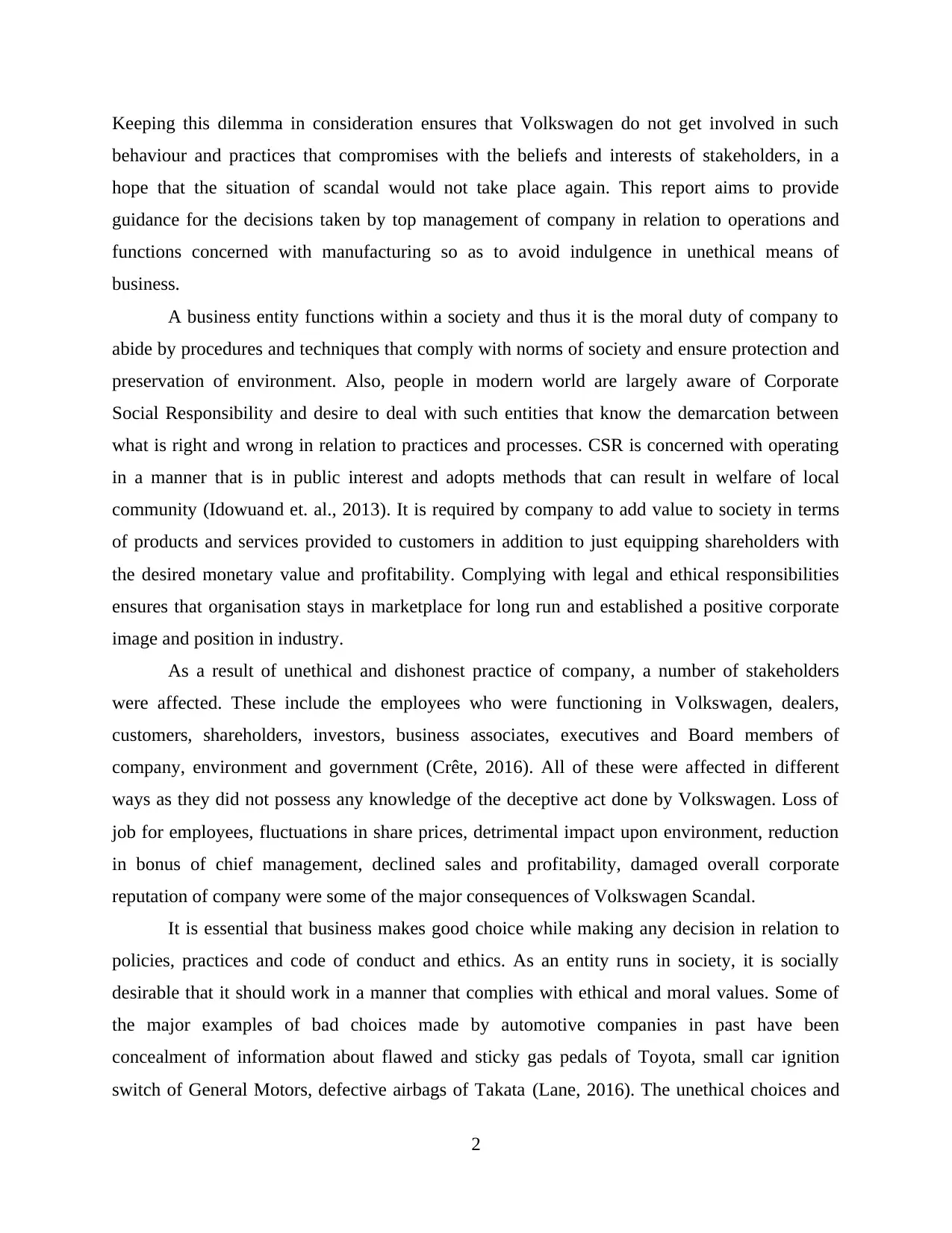
Keeping this dilemma in consideration ensures that Volkswagen do not get involved in such
behaviour and practices that compromises with the beliefs and interests of stakeholders, in a
hope that the situation of scandal would not take place again. This report aims to provide
guidance for the decisions taken by top management of company in relation to operations and
functions concerned with manufacturing so as to avoid indulgence in unethical means of
business.
A business entity functions within a society and thus it is the moral duty of company to
abide by procedures and techniques that comply with norms of society and ensure protection and
preservation of environment. Also, people in modern world are largely aware of Corporate
Social Responsibility and desire to deal with such entities that know the demarcation between
what is right and wrong in relation to practices and processes. CSR is concerned with operating
in a manner that is in public interest and adopts methods that can result in welfare of local
community (Idowuand et. al., 2013). It is required by company to add value to society in terms
of products and services provided to customers in addition to just equipping shareholders with
the desired monetary value and profitability. Complying with legal and ethical responsibilities
ensures that organisation stays in marketplace for long run and established a positive corporate
image and position in industry.
As a result of unethical and dishonest practice of company, a number of stakeholders
were affected. These include the employees who were functioning in Volkswagen, dealers,
customers, shareholders, investors, business associates, executives and Board members of
company, environment and government (Crête, 2016). All of these were affected in different
ways as they did not possess any knowledge of the deceptive act done by Volkswagen. Loss of
job for employees, fluctuations in share prices, detrimental impact upon environment, reduction
in bonus of chief management, declined sales and profitability, damaged overall corporate
reputation of company were some of the major consequences of Volkswagen Scandal.
It is essential that business makes good choice while making any decision in relation to
policies, practices and code of conduct and ethics. As an entity runs in society, it is socially
desirable that it should work in a manner that complies with ethical and moral values. Some of
the major examples of bad choices made by automotive companies in past have been
concealment of information about flawed and sticky gas pedals of Toyota, small car ignition
switch of General Motors, defective airbags of Takata (Lane, 2016). The unethical choices and
2
behaviour and practices that compromises with the beliefs and interests of stakeholders, in a
hope that the situation of scandal would not take place again. This report aims to provide
guidance for the decisions taken by top management of company in relation to operations and
functions concerned with manufacturing so as to avoid indulgence in unethical means of
business.
A business entity functions within a society and thus it is the moral duty of company to
abide by procedures and techniques that comply with norms of society and ensure protection and
preservation of environment. Also, people in modern world are largely aware of Corporate
Social Responsibility and desire to deal with such entities that know the demarcation between
what is right and wrong in relation to practices and processes. CSR is concerned with operating
in a manner that is in public interest and adopts methods that can result in welfare of local
community (Idowuand et. al., 2013). It is required by company to add value to society in terms
of products and services provided to customers in addition to just equipping shareholders with
the desired monetary value and profitability. Complying with legal and ethical responsibilities
ensures that organisation stays in marketplace for long run and established a positive corporate
image and position in industry.
As a result of unethical and dishonest practice of company, a number of stakeholders
were affected. These include the employees who were functioning in Volkswagen, dealers,
customers, shareholders, investors, business associates, executives and Board members of
company, environment and government (Crête, 2016). All of these were affected in different
ways as they did not possess any knowledge of the deceptive act done by Volkswagen. Loss of
job for employees, fluctuations in share prices, detrimental impact upon environment, reduction
in bonus of chief management, declined sales and profitability, damaged overall corporate
reputation of company were some of the major consequences of Volkswagen Scandal.
It is essential that business makes good choice while making any decision in relation to
policies, practices and code of conduct and ethics. As an entity runs in society, it is socially
desirable that it should work in a manner that complies with ethical and moral values. Some of
the major examples of bad choices made by automotive companies in past have been
concealment of information about flawed and sticky gas pedals of Toyota, small car ignition
switch of General Motors, defective airbags of Takata (Lane, 2016). The unethical choices and
2
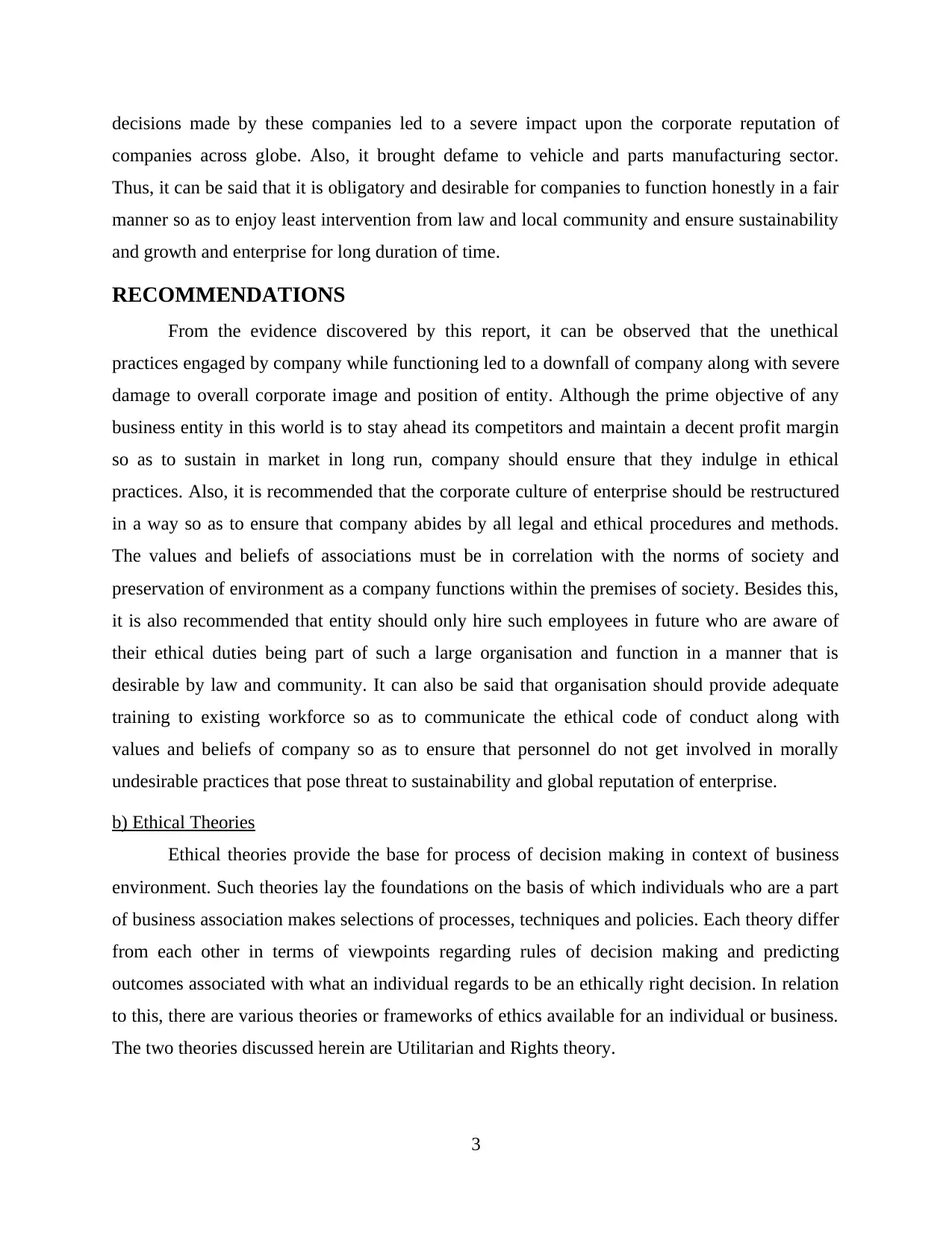
decisions made by these companies led to a severe impact upon the corporate reputation of
companies across globe. Also, it brought defame to vehicle and parts manufacturing sector.
Thus, it can be said that it is obligatory and desirable for companies to function honestly in a fair
manner so as to enjoy least intervention from law and local community and ensure sustainability
and growth and enterprise for long duration of time.
RECOMMENDATIONS
From the evidence discovered by this report, it can be observed that the unethical
practices engaged by company while functioning led to a downfall of company along with severe
damage to overall corporate image and position of entity. Although the prime objective of any
business entity in this world is to stay ahead its competitors and maintain a decent profit margin
so as to sustain in market in long run, company should ensure that they indulge in ethical
practices. Also, it is recommended that the corporate culture of enterprise should be restructured
in a way so as to ensure that company abides by all legal and ethical procedures and methods.
The values and beliefs of associations must be in correlation with the norms of society and
preservation of environment as a company functions within the premises of society. Besides this,
it is also recommended that entity should only hire such employees in future who are aware of
their ethical duties being part of such a large organisation and function in a manner that is
desirable by law and community. It can also be said that organisation should provide adequate
training to existing workforce so as to communicate the ethical code of conduct along with
values and beliefs of company so as to ensure that personnel do not get involved in morally
undesirable practices that pose threat to sustainability and global reputation of enterprise.
b) Ethical Theories
Ethical theories provide the base for process of decision making in context of business
environment. Such theories lay the foundations on the basis of which individuals who are a part
of business association makes selections of processes, techniques and policies. Each theory differ
from each other in terms of viewpoints regarding rules of decision making and predicting
outcomes associated with what an individual regards to be an ethically right decision. In relation
to this, there are various theories or frameworks of ethics available for an individual or business.
The two theories discussed herein are Utilitarian and Rights theory.
3
companies across globe. Also, it brought defame to vehicle and parts manufacturing sector.
Thus, it can be said that it is obligatory and desirable for companies to function honestly in a fair
manner so as to enjoy least intervention from law and local community and ensure sustainability
and growth and enterprise for long duration of time.
RECOMMENDATIONS
From the evidence discovered by this report, it can be observed that the unethical
practices engaged by company while functioning led to a downfall of company along with severe
damage to overall corporate image and position of entity. Although the prime objective of any
business entity in this world is to stay ahead its competitors and maintain a decent profit margin
so as to sustain in market in long run, company should ensure that they indulge in ethical
practices. Also, it is recommended that the corporate culture of enterprise should be restructured
in a way so as to ensure that company abides by all legal and ethical procedures and methods.
The values and beliefs of associations must be in correlation with the norms of society and
preservation of environment as a company functions within the premises of society. Besides this,
it is also recommended that entity should only hire such employees in future who are aware of
their ethical duties being part of such a large organisation and function in a manner that is
desirable by law and community. It can also be said that organisation should provide adequate
training to existing workforce so as to communicate the ethical code of conduct along with
values and beliefs of company so as to ensure that personnel do not get involved in morally
undesirable practices that pose threat to sustainability and global reputation of enterprise.
b) Ethical Theories
Ethical theories provide the base for process of decision making in context of business
environment. Such theories lay the foundations on the basis of which individuals who are a part
of business association makes selections of processes, techniques and policies. Each theory differ
from each other in terms of viewpoints regarding rules of decision making and predicting
outcomes associated with what an individual regards to be an ethically right decision. In relation
to this, there are various theories or frameworks of ethics available for an individual or business.
The two theories discussed herein are Utilitarian and Rights theory.
3
⊘ This is a preview!⊘
Do you want full access?
Subscribe today to unlock all pages.

Trusted by 1+ million students worldwide
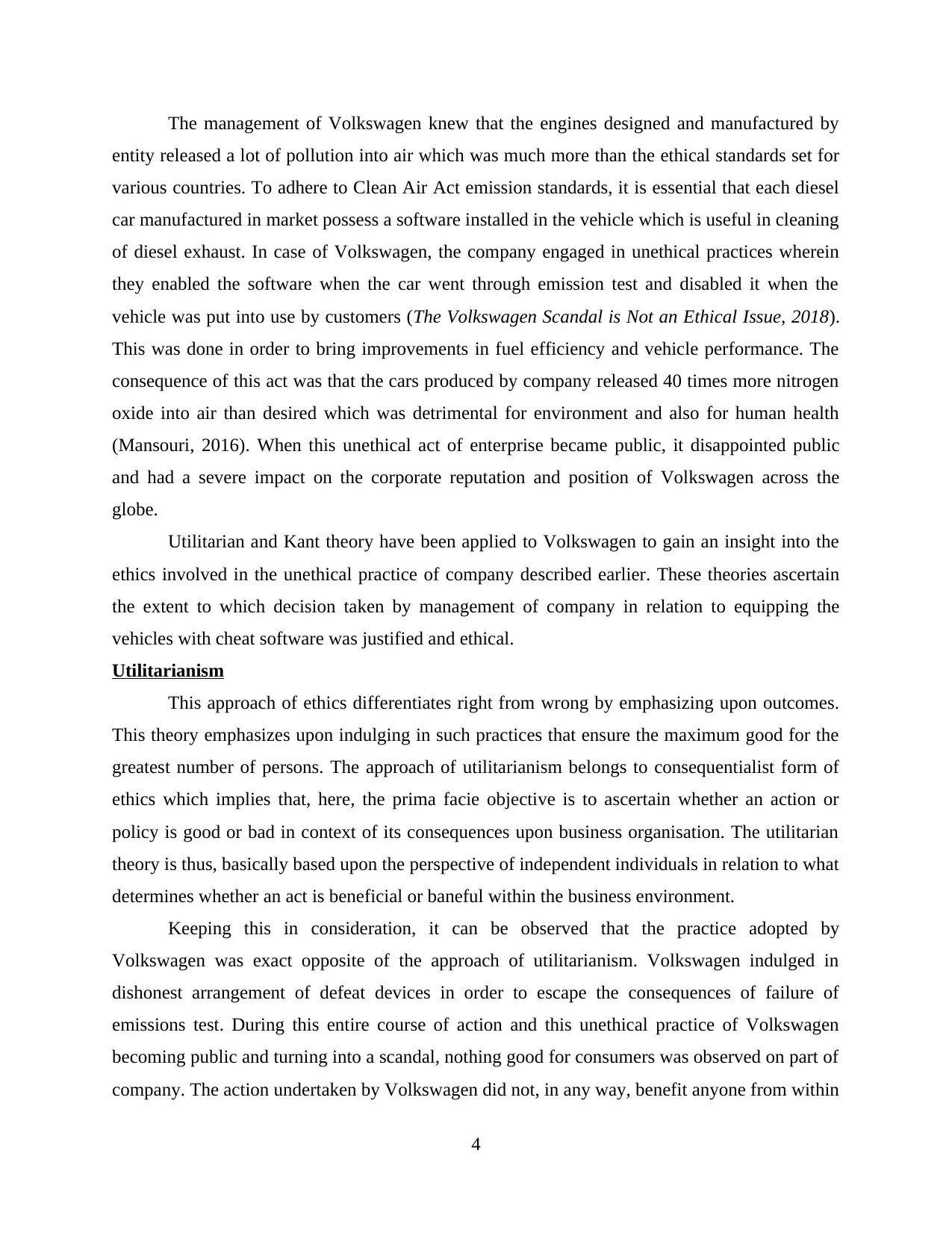
The management of Volkswagen knew that the engines designed and manufactured by
entity released a lot of pollution into air which was much more than the ethical standards set for
various countries. To adhere to Clean Air Act emission standards, it is essential that each diesel
car manufactured in market possess a software installed in the vehicle which is useful in cleaning
of diesel exhaust. In case of Volkswagen, the company engaged in unethical practices wherein
they enabled the software when the car went through emission test and disabled it when the
vehicle was put into use by customers (The Volkswagen Scandal is Not an Ethical Issue, 2018).
This was done in order to bring improvements in fuel efficiency and vehicle performance. The
consequence of this act was that the cars produced by company released 40 times more nitrogen
oxide into air than desired which was detrimental for environment and also for human health
(Mansouri, 2016). When this unethical act of enterprise became public, it disappointed public
and had a severe impact on the corporate reputation and position of Volkswagen across the
globe.
Utilitarian and Kant theory have been applied to Volkswagen to gain an insight into the
ethics involved in the unethical practice of company described earlier. These theories ascertain
the extent to which decision taken by management of company in relation to equipping the
vehicles with cheat software was justified and ethical.
Utilitarianism
This approach of ethics differentiates right from wrong by emphasizing upon outcomes.
This theory emphasizes upon indulging in such practices that ensure the maximum good for the
greatest number of persons. The approach of utilitarianism belongs to consequentialist form of
ethics which implies that, here, the prima facie objective is to ascertain whether an action or
policy is good or bad in context of its consequences upon business organisation. The utilitarian
theory is thus, basically based upon the perspective of independent individuals in relation to what
determines whether an act is beneficial or baneful within the business environment.
Keeping this in consideration, it can be observed that the practice adopted by
Volkswagen was exact opposite of the approach of utilitarianism. Volkswagen indulged in
dishonest arrangement of defeat devices in order to escape the consequences of failure of
emissions test. During this entire course of action and this unethical practice of Volkswagen
becoming public and turning into a scandal, nothing good for consumers was observed on part of
company. The action undertaken by Volkswagen did not, in any way, benefit anyone from within
4
entity released a lot of pollution into air which was much more than the ethical standards set for
various countries. To adhere to Clean Air Act emission standards, it is essential that each diesel
car manufactured in market possess a software installed in the vehicle which is useful in cleaning
of diesel exhaust. In case of Volkswagen, the company engaged in unethical practices wherein
they enabled the software when the car went through emission test and disabled it when the
vehicle was put into use by customers (The Volkswagen Scandal is Not an Ethical Issue, 2018).
This was done in order to bring improvements in fuel efficiency and vehicle performance. The
consequence of this act was that the cars produced by company released 40 times more nitrogen
oxide into air than desired which was detrimental for environment and also for human health
(Mansouri, 2016). When this unethical act of enterprise became public, it disappointed public
and had a severe impact on the corporate reputation and position of Volkswagen across the
globe.
Utilitarian and Kant theory have been applied to Volkswagen to gain an insight into the
ethics involved in the unethical practice of company described earlier. These theories ascertain
the extent to which decision taken by management of company in relation to equipping the
vehicles with cheat software was justified and ethical.
Utilitarianism
This approach of ethics differentiates right from wrong by emphasizing upon outcomes.
This theory emphasizes upon indulging in such practices that ensure the maximum good for the
greatest number of persons. The approach of utilitarianism belongs to consequentialist form of
ethics which implies that, here, the prima facie objective is to ascertain whether an action or
policy is good or bad in context of its consequences upon business organisation. The utilitarian
theory is thus, basically based upon the perspective of independent individuals in relation to what
determines whether an act is beneficial or baneful within the business environment.
Keeping this in consideration, it can be observed that the practice adopted by
Volkswagen was exact opposite of the approach of utilitarianism. Volkswagen indulged in
dishonest arrangement of defeat devices in order to escape the consequences of failure of
emissions test. During this entire course of action and this unethical practice of Volkswagen
becoming public and turning into a scandal, nothing good for consumers was observed on part of
company. The action undertaken by Volkswagen did not, in any way, benefit anyone from within
4
Paraphrase This Document
Need a fresh take? Get an instant paraphrase of this document with our AI Paraphraser
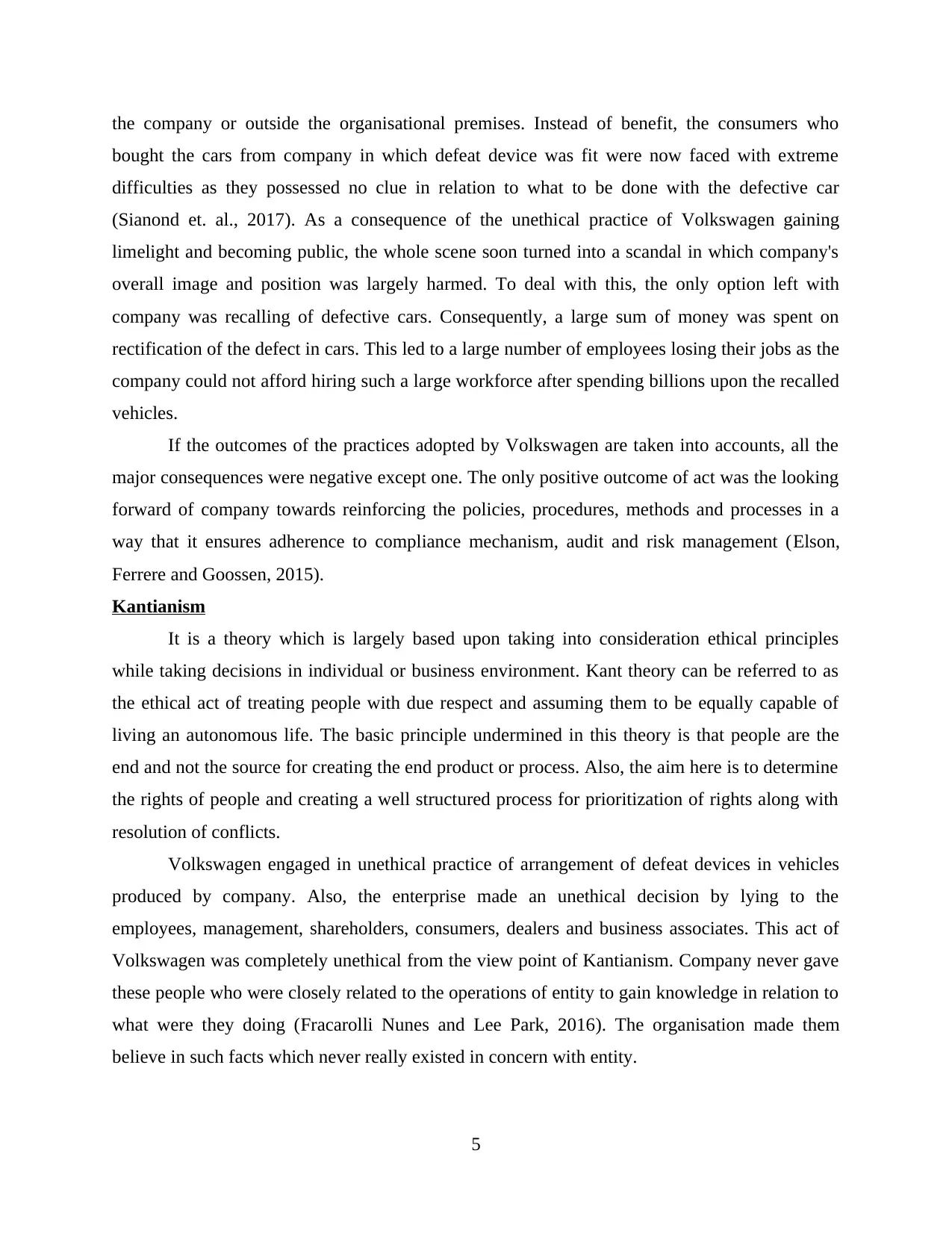
the company or outside the organisational premises. Instead of benefit, the consumers who
bought the cars from company in which defeat device was fit were now faced with extreme
difficulties as they possessed no clue in relation to what to be done with the defective car
(Sianond et. al., 2017). As a consequence of the unethical practice of Volkswagen gaining
limelight and becoming public, the whole scene soon turned into a scandal in which company's
overall image and position was largely harmed. To deal with this, the only option left with
company was recalling of defective cars. Consequently, a large sum of money was spent on
rectification of the defect in cars. This led to a large number of employees losing their jobs as the
company could not afford hiring such a large workforce after spending billions upon the recalled
vehicles.
If the outcomes of the practices adopted by Volkswagen are taken into accounts, all the
major consequences were negative except one. The only positive outcome of act was the looking
forward of company towards reinforcing the policies, procedures, methods and processes in a
way that it ensures adherence to compliance mechanism, audit and risk management (Elson,
Ferrere and Goossen, 2015).
Kantianism
It is a theory which is largely based upon taking into consideration ethical principles
while taking decisions in individual or business environment. Kant theory can be referred to as
the ethical act of treating people with due respect and assuming them to be equally capable of
living an autonomous life. The basic principle undermined in this theory is that people are the
end and not the source for creating the end product or process. Also, the aim here is to determine
the rights of people and creating a well structured process for prioritization of rights along with
resolution of conflicts.
Volkswagen engaged in unethical practice of arrangement of defeat devices in vehicles
produced by company. Also, the enterprise made an unethical decision by lying to the
employees, management, shareholders, consumers, dealers and business associates. This act of
Volkswagen was completely unethical from the view point of Kantianism. Company never gave
these people who were closely related to the operations of entity to gain knowledge in relation to
what were they doing (Fracarolli Nunes and Lee Park, 2016). The organisation made them
believe in such facts which never really existed in concern with entity.
5
bought the cars from company in which defeat device was fit were now faced with extreme
difficulties as they possessed no clue in relation to what to be done with the defective car
(Sianond et. al., 2017). As a consequence of the unethical practice of Volkswagen gaining
limelight and becoming public, the whole scene soon turned into a scandal in which company's
overall image and position was largely harmed. To deal with this, the only option left with
company was recalling of defective cars. Consequently, a large sum of money was spent on
rectification of the defect in cars. This led to a large number of employees losing their jobs as the
company could not afford hiring such a large workforce after spending billions upon the recalled
vehicles.
If the outcomes of the practices adopted by Volkswagen are taken into accounts, all the
major consequences were negative except one. The only positive outcome of act was the looking
forward of company towards reinforcing the policies, procedures, methods and processes in a
way that it ensures adherence to compliance mechanism, audit and risk management (Elson,
Ferrere and Goossen, 2015).
Kantianism
It is a theory which is largely based upon taking into consideration ethical principles
while taking decisions in individual or business environment. Kant theory can be referred to as
the ethical act of treating people with due respect and assuming them to be equally capable of
living an autonomous life. The basic principle undermined in this theory is that people are the
end and not the source for creating the end product or process. Also, the aim here is to determine
the rights of people and creating a well structured process for prioritization of rights along with
resolution of conflicts.
Volkswagen engaged in unethical practice of arrangement of defeat devices in vehicles
produced by company. Also, the enterprise made an unethical decision by lying to the
employees, management, shareholders, consumers, dealers and business associates. This act of
Volkswagen was completely unethical from the view point of Kantianism. Company never gave
these people who were closely related to the operations of entity to gain knowledge in relation to
what were they doing (Fracarolli Nunes and Lee Park, 2016). The organisation made them
believe in such facts which never really existed in concern with entity.
5
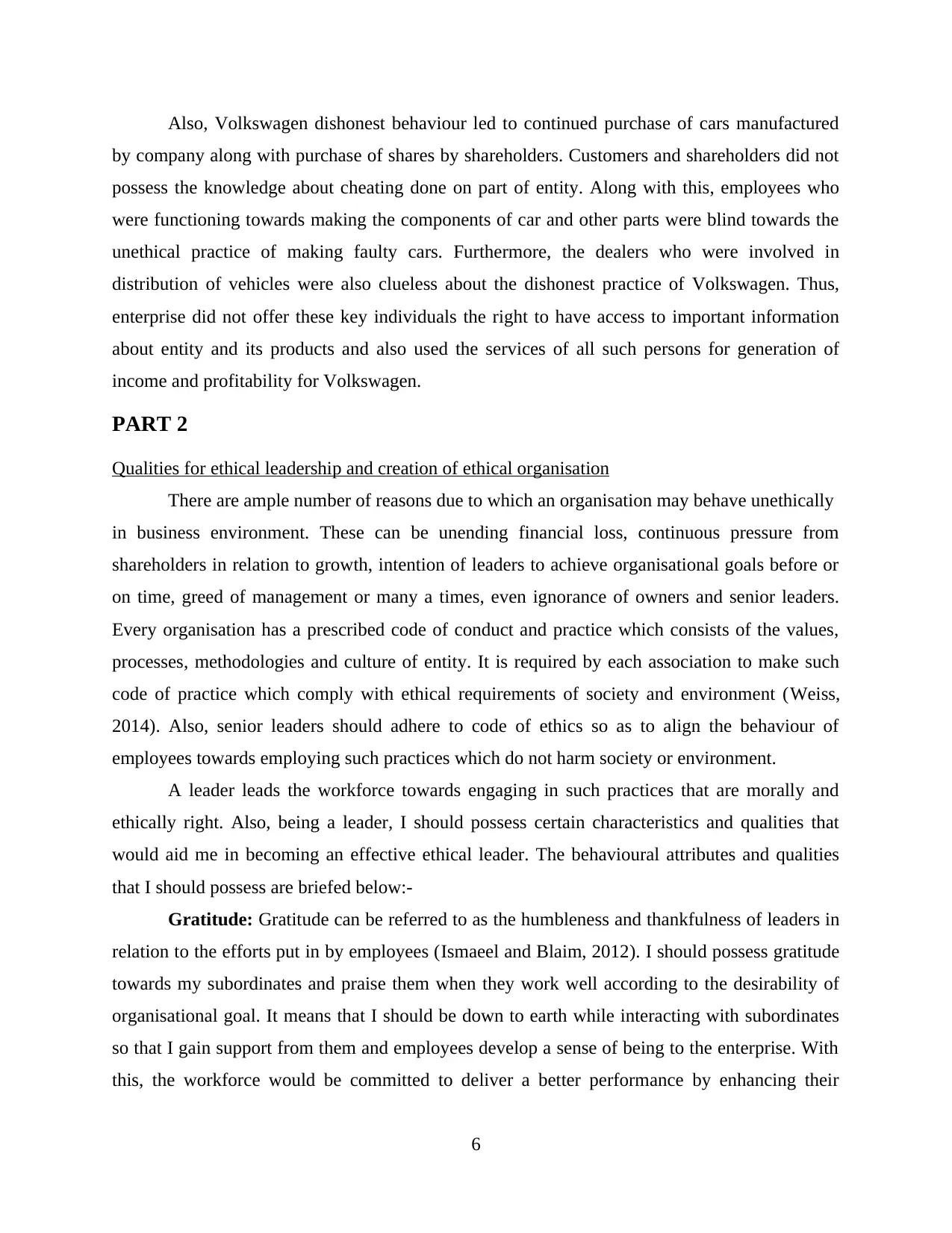
Also, Volkswagen dishonest behaviour led to continued purchase of cars manufactured
by company along with purchase of shares by shareholders. Customers and shareholders did not
possess the knowledge about cheating done on part of entity. Along with this, employees who
were functioning towards making the components of car and other parts were blind towards the
unethical practice of making faulty cars. Furthermore, the dealers who were involved in
distribution of vehicles were also clueless about the dishonest practice of Volkswagen. Thus,
enterprise did not offer these key individuals the right to have access to important information
about entity and its products and also used the services of all such persons for generation of
income and profitability for Volkswagen.
PART 2
Qualities for ethical leadership and creation of ethical organisation
There are ample number of reasons due to which an organisation may behave unethically
in business environment. These can be unending financial loss, continuous pressure from
shareholders in relation to growth, intention of leaders to achieve organisational goals before or
on time, greed of management or many a times, even ignorance of owners and senior leaders.
Every organisation has a prescribed code of conduct and practice which consists of the values,
processes, methodologies and culture of entity. It is required by each association to make such
code of practice which comply with ethical requirements of society and environment (Weiss,
2014). Also, senior leaders should adhere to code of ethics so as to align the behaviour of
employees towards employing such practices which do not harm society or environment.
A leader leads the workforce towards engaging in such practices that are morally and
ethically right. Also, being a leader, I should possess certain characteristics and qualities that
would aid me in becoming an effective ethical leader. The behavioural attributes and qualities
that I should possess are briefed below:-
Gratitude: Gratitude can be referred to as the humbleness and thankfulness of leaders in
relation to the efforts put in by employees (Ismaeel and Blaim, 2012). I should possess gratitude
towards my subordinates and praise them when they work well according to the desirability of
organisational goal. It means that I should be down to earth while interacting with subordinates
so that I gain support from them and employees develop a sense of being to the enterprise. With
this, the workforce would be committed to deliver a better performance by enhancing their
6
by company along with purchase of shares by shareholders. Customers and shareholders did not
possess the knowledge about cheating done on part of entity. Along with this, employees who
were functioning towards making the components of car and other parts were blind towards the
unethical practice of making faulty cars. Furthermore, the dealers who were involved in
distribution of vehicles were also clueless about the dishonest practice of Volkswagen. Thus,
enterprise did not offer these key individuals the right to have access to important information
about entity and its products and also used the services of all such persons for generation of
income and profitability for Volkswagen.
PART 2
Qualities for ethical leadership and creation of ethical organisation
There are ample number of reasons due to which an organisation may behave unethically
in business environment. These can be unending financial loss, continuous pressure from
shareholders in relation to growth, intention of leaders to achieve organisational goals before or
on time, greed of management or many a times, even ignorance of owners and senior leaders.
Every organisation has a prescribed code of conduct and practice which consists of the values,
processes, methodologies and culture of entity. It is required by each association to make such
code of practice which comply with ethical requirements of society and environment (Weiss,
2014). Also, senior leaders should adhere to code of ethics so as to align the behaviour of
employees towards employing such practices which do not harm society or environment.
A leader leads the workforce towards engaging in such practices that are morally and
ethically right. Also, being a leader, I should possess certain characteristics and qualities that
would aid me in becoming an effective ethical leader. The behavioural attributes and qualities
that I should possess are briefed below:-
Gratitude: Gratitude can be referred to as the humbleness and thankfulness of leaders in
relation to the efforts put in by employees (Ismaeel and Blaim, 2012). I should possess gratitude
towards my subordinates and praise them when they work well according to the desirability of
organisational goal. It means that I should be down to earth while interacting with subordinates
so that I gain support from them and employees develop a sense of being to the enterprise. With
this, the workforce would be committed to deliver a better performance by enhancing their
6
⊘ This is a preview!⊘
Do you want full access?
Subscribe today to unlock all pages.

Trusted by 1+ million students worldwide
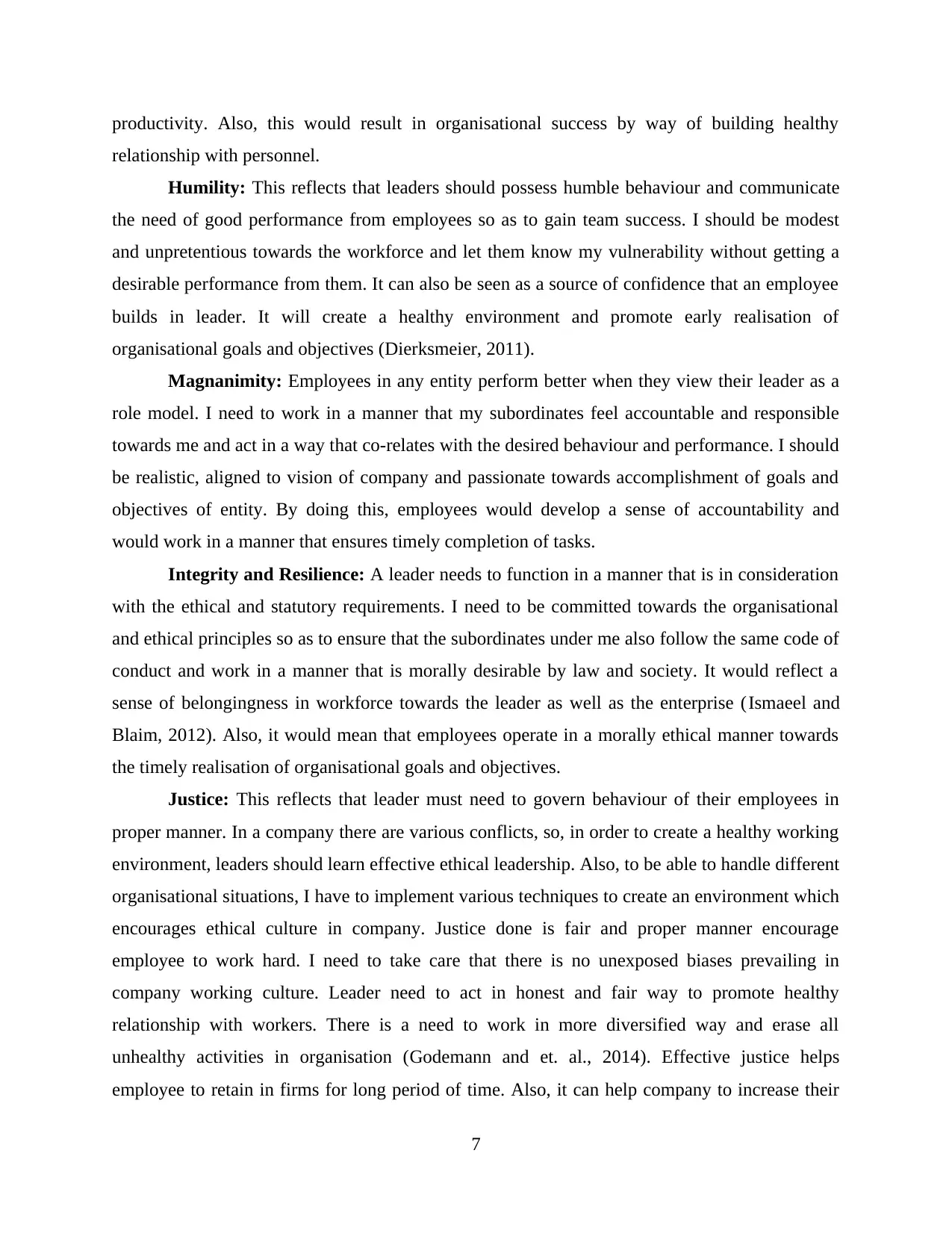
productivity. Also, this would result in organisational success by way of building healthy
relationship with personnel.
Humility: This reflects that leaders should possess humble behaviour and communicate
the need of good performance from employees so as to gain team success. I should be modest
and unpretentious towards the workforce and let them know my vulnerability without getting a
desirable performance from them. It can also be seen as a source of confidence that an employee
builds in leader. It will create a healthy environment and promote early realisation of
organisational goals and objectives (Dierksmeier, 2011).
Magnanimity: Employees in any entity perform better when they view their leader as a
role model. I need to work in a manner that my subordinates feel accountable and responsible
towards me and act in a way that co-relates with the desired behaviour and performance. I should
be realistic, aligned to vision of company and passionate towards accomplishment of goals and
objectives of entity. By doing this, employees would develop a sense of accountability and
would work in a manner that ensures timely completion of tasks.
Integrity and Resilience: A leader needs to function in a manner that is in consideration
with the ethical and statutory requirements. I need to be committed towards the organisational
and ethical principles so as to ensure that the subordinates under me also follow the same code of
conduct and work in a manner that is morally desirable by law and society. It would reflect a
sense of belongingness in workforce towards the leader as well as the enterprise (Ismaeel and
Blaim, 2012). Also, it would mean that employees operate in a morally ethical manner towards
the timely realisation of organisational goals and objectives.
Justice: This reflects that leader must need to govern behaviour of their employees in
proper manner. In a company there are various conflicts, so, in order to create a healthy working
environment, leaders should learn effective ethical leadership. Also, to be able to handle different
organisational situations, I have to implement various techniques to create an environment which
encourages ethical culture in company. Justice done is fair and proper manner encourage
employee to work hard. I need to take care that there is no unexposed biases prevailing in
company working culture. Leader need to act in honest and fair way to promote healthy
relationship with workers. There is a need to work in more diversified way and erase all
unhealthy activities in organisation (Godemann and et. al., 2014). Effective justice helps
employee to retain in firms for long period of time. Also, it can help company to increase their
7
relationship with personnel.
Humility: This reflects that leaders should possess humble behaviour and communicate
the need of good performance from employees so as to gain team success. I should be modest
and unpretentious towards the workforce and let them know my vulnerability without getting a
desirable performance from them. It can also be seen as a source of confidence that an employee
builds in leader. It will create a healthy environment and promote early realisation of
organisational goals and objectives (Dierksmeier, 2011).
Magnanimity: Employees in any entity perform better when they view their leader as a
role model. I need to work in a manner that my subordinates feel accountable and responsible
towards me and act in a way that co-relates with the desired behaviour and performance. I should
be realistic, aligned to vision of company and passionate towards accomplishment of goals and
objectives of entity. By doing this, employees would develop a sense of accountability and
would work in a manner that ensures timely completion of tasks.
Integrity and Resilience: A leader needs to function in a manner that is in consideration
with the ethical and statutory requirements. I need to be committed towards the organisational
and ethical principles so as to ensure that the subordinates under me also follow the same code of
conduct and work in a manner that is morally desirable by law and society. It would reflect a
sense of belongingness in workforce towards the leader as well as the enterprise (Ismaeel and
Blaim, 2012). Also, it would mean that employees operate in a morally ethical manner towards
the timely realisation of organisational goals and objectives.
Justice: This reflects that leader must need to govern behaviour of their employees in
proper manner. In a company there are various conflicts, so, in order to create a healthy working
environment, leaders should learn effective ethical leadership. Also, to be able to handle different
organisational situations, I have to implement various techniques to create an environment which
encourages ethical culture in company. Justice done is fair and proper manner encourage
employee to work hard. I need to take care that there is no unexposed biases prevailing in
company working culture. Leader need to act in honest and fair way to promote healthy
relationship with workers. There is a need to work in more diversified way and erase all
unhealthy activities in organisation (Godemann and et. al., 2014). Effective justice helps
employee to retain in firms for long period of time. Also, it can help company to increase their
7
Paraphrase This Document
Need a fresh take? Get an instant paraphrase of this document with our AI Paraphraser
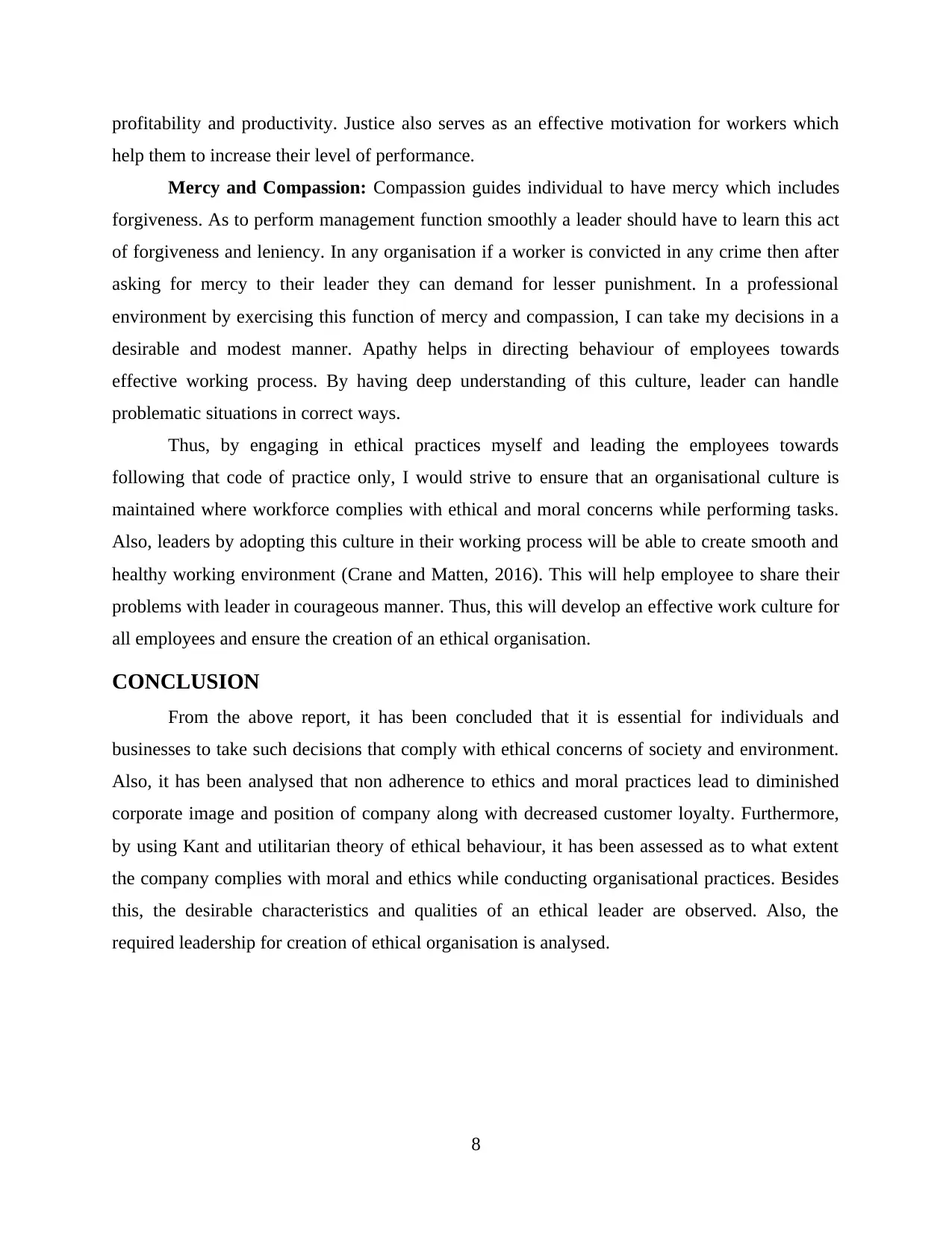
profitability and productivity. Justice also serves as an effective motivation for workers which
help them to increase their level of performance.
Mercy and Compassion: Compassion guides individual to have mercy which includes
forgiveness. As to perform management function smoothly a leader should have to learn this act
of forgiveness and leniency. In any organisation if a worker is convicted in any crime then after
asking for mercy to their leader they can demand for lesser punishment. In a professional
environment by exercising this function of mercy and compassion, I can take my decisions in a
desirable and modest manner. Apathy helps in directing behaviour of employees towards
effective working process. By having deep understanding of this culture, leader can handle
problematic situations in correct ways.
Thus, by engaging in ethical practices myself and leading the employees towards
following that code of practice only, I would strive to ensure that an organisational culture is
maintained where workforce complies with ethical and moral concerns while performing tasks.
Also, leaders by adopting this culture in their working process will be able to create smooth and
healthy working environment (Crane and Matten, 2016). This will help employee to share their
problems with leader in courageous manner. Thus, this will develop an effective work culture for
all employees and ensure the creation of an ethical organisation.
CONCLUSION
From the above report, it has been concluded that it is essential for individuals and
businesses to take such decisions that comply with ethical concerns of society and environment.
Also, it has been analysed that non adherence to ethics and moral practices lead to diminished
corporate image and position of company along with decreased customer loyalty. Furthermore,
by using Kant and utilitarian theory of ethical behaviour, it has been assessed as to what extent
the company complies with moral and ethics while conducting organisational practices. Besides
this, the desirable characteristics and qualities of an ethical leader are observed. Also, the
required leadership for creation of ethical organisation is analysed.
8
help them to increase their level of performance.
Mercy and Compassion: Compassion guides individual to have mercy which includes
forgiveness. As to perform management function smoothly a leader should have to learn this act
of forgiveness and leniency. In any organisation if a worker is convicted in any crime then after
asking for mercy to their leader they can demand for lesser punishment. In a professional
environment by exercising this function of mercy and compassion, I can take my decisions in a
desirable and modest manner. Apathy helps in directing behaviour of employees towards
effective working process. By having deep understanding of this culture, leader can handle
problematic situations in correct ways.
Thus, by engaging in ethical practices myself and leading the employees towards
following that code of practice only, I would strive to ensure that an organisational culture is
maintained where workforce complies with ethical and moral concerns while performing tasks.
Also, leaders by adopting this culture in their working process will be able to create smooth and
healthy working environment (Crane and Matten, 2016). This will help employee to share their
problems with leader in courageous manner. Thus, this will develop an effective work culture for
all employees and ensure the creation of an ethical organisation.
CONCLUSION
From the above report, it has been concluded that it is essential for individuals and
businesses to take such decisions that comply with ethical concerns of society and environment.
Also, it has been analysed that non adherence to ethics and moral practices lead to diminished
corporate image and position of company along with decreased customer loyalty. Furthermore,
by using Kant and utilitarian theory of ethical behaviour, it has been assessed as to what extent
the company complies with moral and ethics while conducting organisational practices. Besides
this, the desirable characteristics and qualities of an ethical leader are observed. Also, the
required leadership for creation of ethical organisation is analysed.
8
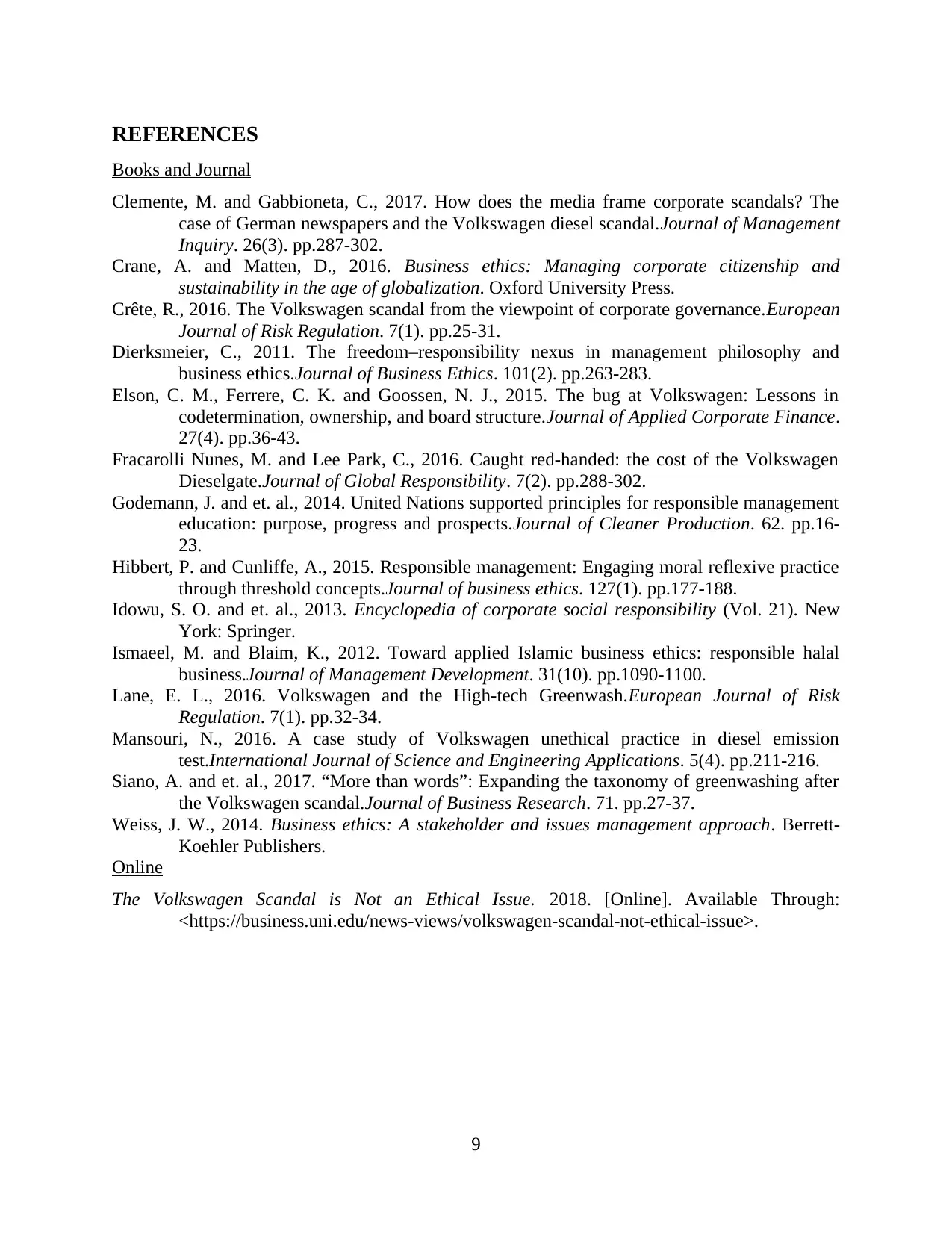
REFERENCES
Books and Journal
Clemente, M. and Gabbioneta, C., 2017. How does the media frame corporate scandals? The
case of German newspapers and the Volkswagen diesel scandal.Journal of Management
Inquiry. 26(3). pp.287-302.
Crane, A. and Matten, D., 2016. Business ethics: Managing corporate citizenship and
sustainability in the age of globalization. Oxford University Press.
Crête, R., 2016. The Volkswagen scandal from the viewpoint of corporate governance.European
Journal of Risk Regulation. 7(1). pp.25-31.
Dierksmeier, C., 2011. The freedom–responsibility nexus in management philosophy and
business ethics.Journal of Business Ethics. 101(2). pp.263-283.
Elson, C. M., Ferrere, C. K. and Goossen, N. J., 2015. The bug at Volkswagen: Lessons in
codetermination, ownership, and board structure.Journal of Applied Corporate Finance.
27(4). pp.36-43.
Fracarolli Nunes, M. and Lee Park, C., 2016. Caught red-handed: the cost of the Volkswagen
Dieselgate.Journal of Global Responsibility. 7(2). pp.288-302.
Godemann, J. and et. al., 2014. United Nations supported principles for responsible management
education: purpose, progress and prospects.Journal of Cleaner Production. 62. pp.16-
23.
Hibbert, P. and Cunliffe, A., 2015. Responsible management: Engaging moral reflexive practice
through threshold concepts.Journal of business ethics. 127(1). pp.177-188.
Idowu, S. O. and et. al., 2013. Encyclopedia of corporate social responsibility (Vol. 21). New
York: Springer.
Ismaeel, M. and Blaim, K., 2012. Toward applied Islamic business ethics: responsible halal
business.Journal of Management Development. 31(10). pp.1090-1100.
Lane, E. L., 2016. Volkswagen and the High-tech Greenwash.European Journal of Risk
Regulation. 7(1). pp.32-34.
Mansouri, N., 2016. A case study of Volkswagen unethical practice in diesel emission
test.International Journal of Science and Engineering Applications. 5(4). pp.211-216.
Siano, A. and et. al., 2017. “More than words”: Expanding the taxonomy of greenwashing after
the Volkswagen scandal.Journal of Business Research. 71. pp.27-37.
Weiss, J. W., 2014. Business ethics: A stakeholder and issues management approach. Berrett-
Koehler Publishers.
Online
The Volkswagen Scandal is Not an Ethical Issue. 2018. [Online]. Available Through:
<https://business.uni.edu/news-views/volkswagen-scandal-not-ethical-issue>.
9
Books and Journal
Clemente, M. and Gabbioneta, C., 2017. How does the media frame corporate scandals? The
case of German newspapers and the Volkswagen diesel scandal.Journal of Management
Inquiry. 26(3). pp.287-302.
Crane, A. and Matten, D., 2016. Business ethics: Managing corporate citizenship and
sustainability in the age of globalization. Oxford University Press.
Crête, R., 2016. The Volkswagen scandal from the viewpoint of corporate governance.European
Journal of Risk Regulation. 7(1). pp.25-31.
Dierksmeier, C., 2011. The freedom–responsibility nexus in management philosophy and
business ethics.Journal of Business Ethics. 101(2). pp.263-283.
Elson, C. M., Ferrere, C. K. and Goossen, N. J., 2015. The bug at Volkswagen: Lessons in
codetermination, ownership, and board structure.Journal of Applied Corporate Finance.
27(4). pp.36-43.
Fracarolli Nunes, M. and Lee Park, C., 2016. Caught red-handed: the cost of the Volkswagen
Dieselgate.Journal of Global Responsibility. 7(2). pp.288-302.
Godemann, J. and et. al., 2014. United Nations supported principles for responsible management
education: purpose, progress and prospects.Journal of Cleaner Production. 62. pp.16-
23.
Hibbert, P. and Cunliffe, A., 2015. Responsible management: Engaging moral reflexive practice
through threshold concepts.Journal of business ethics. 127(1). pp.177-188.
Idowu, S. O. and et. al., 2013. Encyclopedia of corporate social responsibility (Vol. 21). New
York: Springer.
Ismaeel, M. and Blaim, K., 2012. Toward applied Islamic business ethics: responsible halal
business.Journal of Management Development. 31(10). pp.1090-1100.
Lane, E. L., 2016. Volkswagen and the High-tech Greenwash.European Journal of Risk
Regulation. 7(1). pp.32-34.
Mansouri, N., 2016. A case study of Volkswagen unethical practice in diesel emission
test.International Journal of Science and Engineering Applications. 5(4). pp.211-216.
Siano, A. and et. al., 2017. “More than words”: Expanding the taxonomy of greenwashing after
the Volkswagen scandal.Journal of Business Research. 71. pp.27-37.
Weiss, J. W., 2014. Business ethics: A stakeholder and issues management approach. Berrett-
Koehler Publishers.
Online
The Volkswagen Scandal is Not an Ethical Issue. 2018. [Online]. Available Through:
<https://business.uni.edu/news-views/volkswagen-scandal-not-ethical-issue>.
9
⊘ This is a preview!⊘
Do you want full access?
Subscribe today to unlock all pages.

Trusted by 1+ million students worldwide
1 out of 12
Related Documents
Your All-in-One AI-Powered Toolkit for Academic Success.
+13062052269
info@desklib.com
Available 24*7 on WhatsApp / Email
![[object Object]](/_next/static/media/star-bottom.7253800d.svg)
Unlock your academic potential
Copyright © 2020–2026 A2Z Services. All Rights Reserved. Developed and managed by ZUCOL.





